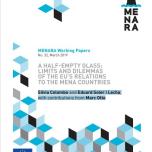
Open Online Course: Euro-Mediterranean Intercultural Trends
A learning journey through the Anna Lindh Report “Intercultural Trends and Social Change in the Euro-Mediterranean region”
التدريب العملي على ALF: دعوة مفتوحة للمشاركة! - الدورة الثانية
جعل الأبحاث، النماذج الناجحة، الفعاليات، وأنشطة التعلم حول الحوار بين الثقافات في المنطقة الأورو-متوسطية متاحة للجميع.

في هذا القسم ستجد منشورات ، فعاليات ، نماذج ناجحة ، أنشطة التعلم وخبراء فيما يتعلق بالتعلم المشترك بين الثقافات في المنطقة الأورو-متوسطية.
A learning journey through the Anna Lindh Report “Intercultural Trends and Social Change in the Euro-Mediterranean region”

The document outlines the challenges faced by the EU over time in its relations with North Africa and the Middle East. The EU has had a long and storied relationship with MENA. Its development began during the 1990’s. With the...
Dans le cadre du programme « villes et d'apprentissage interculturel » de la Fondation Anna Lindh qui vise à préparer les habitants de la région à vivre et à être actifs dans des sociétés multicult
Dans le cadre du Marathon virtuel de la FAL pour le dialogue dans la région EuroMed, l'UNESCO et la Fondation Anna Lindh organisent une formation sur les compétences interculturelles pour les jeune
Vous souhaitez mieux comprendre les différentes cultures des peuples autour de la Méditerranée et les valeurs qu'ils portent ?
The Summer School on Euro-Arab Relations encompasses five days to learn, connect, network, and make your voice heard by contributing to the discussion on Euro-Arab relations.
Females around the word!

Both Latvia and Israel are dealing with significant percentages of pupils from minority groups. These include Russian-speakers in both countries and Arabic speakers in Israel. Due to historical reasons, these minorities are facing discrimination, social exclusion, lack of a sense...

Les enfants sont les futurs acteurs de la zone euro-méditerranéenne et ils représentent environ 20 à 40 pour cent de la population de la région. Alors que c'est pendant l'enfance que les compétences interculturelles doivent être acquises et répétées, les...
Le 30 septembre, la FAL lance officiellement le Marathon Virtuel pour le Dialogue de la Fondation Anna Lindh dans la région EuroMed - Contribution de la FAL au 25ème anniversaire du Processus de Ba